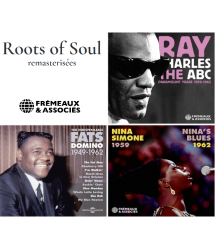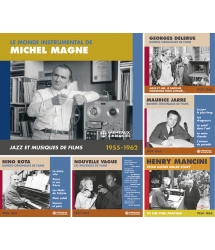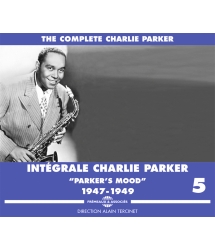“Even casual jazz fans know that alto saxophonist Charlie “Bird” Parker was one of the founding fathers of modern jazz, that his career was cut short and that most contemporary players are still working through things that he introduced to the music. Many would also be aware that he produced many of his most famous recordings during the late ‘40s. Several of these appear on this set, about half of which comes from Bird’s last three studio sessions for Savoy, one of the two fledgling indie labels that held “exclusive” deals with him at the time. Shortly after the last of these sessions, Parker signed with Mercury and producer Norman Granz, with whom he would remain until the end. And while he certainly recorded a lot of significant music for Granz, his legacy is defined by the Savoy and Dial work and the best of his live recordings. That brings us to the fact that this “complete” set really makes no pretense at being so, though it does aim to steer a sensible course through waters that have been muddy ever since Jazz at Massy Hall first appeared with the name “Charlie Chan” on the cover in 1953. The idea is to exclude most of the privately made live recordings for reasons of sound quality. Thus we do not get the high-octane but low-fidelity Onyx club recordings that were released as Bird on 52nd St. and other such informal recordings. But this series will certainly make the process of getting most of Parker’s music in one place easier than it has been. The sound quality is quite good, as are Alain Tercinet’s notes. Tercinet doesn’t mind the occasional far-reaching statement, but as these are all of the well-considered variety, they add rather than detract. One can only envy younger listeners who will be able to start with this series and add to it as they wish. The Savoy sessions are presented as recorded, beginning with the 12/21/1947 quintet date (just four days after the last Dial session, with JJ Johnson), with all the alternate tracks in sequence. Honestly, a collection of this sort can’t really do things any other way and for those who know the music well, it’s always intriguing to hear Parker and his working band (trumpeter Miles Davis, bassist Curley Russell, drummer Max Roach and either Duke Jordan or John Lewis on piano) wrestle the tunes to the ground. Parker challenged himself as a soloist almost every time out, with the inevitable result that he sometimes painted himself into a corner and had to cut things short. Just as often, promising improvs were marred by reed problems. And if Parker would sometimes make faux pas, Davis at age 21 or 22 could hardly be expected not to, though by late 1947 he had matured considerably from his debut with Bird two years earlier. These sessions did not produce many of Parker’s most famous compositions, but some of the writing is quite innovative, like “Ah-Leu-Cha” and its use of counterpoint (in which John Lewis is said to have had a hand) or pieces like “Another Hair-Do” for the way composed and improvised material is combined. One tune that did achieve classic status was the largely improvised “Parker’s Mood”. But probably the biggest attraction was the outrageous blowing on tracks like “Bird Gets the Worm” and “Klaunstance”, which sounded as wild to 1948 ears as Ornette Coleman would a decade later. In September 1948, Parker’s quintet was recorded doing a broadcast from the Royal Roost and discographies list another 16 such broadcast dates over the next six months. But how many will wind up being included in the Fremeaux series remains to be seen, as only two of the five broadcasts from the timespan covered have been included here (sound quality considerations, again). For the Dec. 11th date, Al Haig has replaced Duke Jordan on piano. Haig had worked with Parker in 1945-46 so the transition was fairly seamless. Rather more serious was the sudden departure of Miles Davis, who was replaced by Kenny Dorham just in time for the Christmas day broadcast that accounts for most of the third disc here. Given the fact that Parker hated rehearsals, one has to marvel at how well Dorham handled himself right from the start. The Royal Roost recordings are valuable for the opportunity they provide to hear Bird’s working band during what was a time of transition for them and phenomenal creativity for him. The last five tracks on CD three date from the Metronome All-Star session of January 1949, which featured modernists of various stripes, from beboppers to cool-schoolers like Lennie Tristano, whose typically gnarly “Victory Ball” is entertaining for many reasons, including Davis’ earnest attempt at a high-note climax to his solo.”
Par Duck BAKER - THE NEW YORK CITY JAZZ RECORD
Par Duck BAKER - THE NEW YORK CITY JAZZ RECORD











